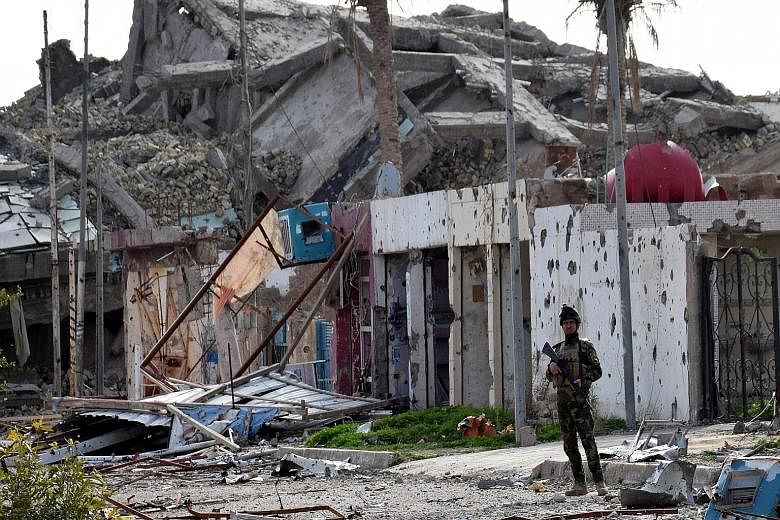RAMADI (Iraq) • As his armoured vehicle bounced along a dirt track carved through the ruins of this recently reconquered city on Wednesday, General Ali Jameel, an Iraqi counter-terrorism officer, narrated the passing sites.
Here were the carcasses of four tanks, charred by Islamic State in Iraq and Syria (ISIS) extremists. Here, the home of a police officer they had blown up. Here, a villa reduced to rubble by an air strike. And another. And another. In one neighbourhood, he stood before a panorama of wreckage so vast that it was unclear where the original buildings had stood. He paused when asked how residents would return to their homes. "Homes?" he said. "There are no homes."
The retaking of Ramadi by Iraqi security forces last week has been hailed as a major blow to ISIS and as a vindication of the Obama administration's strategy to fight the group by backing local ground forces with intensive air strikes.
But the widespread destruction of Ramadi bears testament to the tremendous costs of dislodging a group that stitches itself into the urban fabric of communities it seizes by occupying homes, digging tunnels and laying extensive explosives.
The US-led coalition that is bombing ISIS says that the air campaign is working and that the group has lost 30 per cent of the territory it controlled in Iraq and Syria. Iraq's Prime Minister Haider al-Abadi has vowed that this year will see ISIS "terminated in Iraq".
Still, the question looms of what such a victory would leave behind.
The coalition's successes in Kobane, Syria and Sinjar have also left communities in ruins, with few resources to rebuild. And defeating ISIS will require extracting it from the much larger cities of Raqqa, Syria, and Mosul, as well as from many other towns and villages.
Iraqi officials said their forces now held 80 per cent of Ramadi, about 112km west of Baghdad and the capital of Sunni-dominated Anbar province, and that fighting continued on the outskirts. During a visit on Wednesday, the booms of artillery fire filled the air, followed by clouds of smoke rising on the horizon. Two Iraqi attack helicopters circled and jets from the international coalition growled overhead.
Before the offensive, there were questions about what part of Iraq's security apparatus should lead the fighting. The Iraqi army, which lost the city to ISIS in May, is still lightly regarded. Shi'ite militias, which have proved effective in battles against the extremists, are generally unwelcome in Sunni areas and have been accused by human rights groups of carrying out revenge attacks.
In the end, it appears that heavy coalition air strikes opened the way for the Iraqi Counter Terrorism Service, generally considered the country's most professional and capable security force. Formed by the US about a decade ago, and still receiving training and support from the US military, it operates exclusively under Mr Abadi's office.
Iraqi and coalition officials placed blame for the city's destruction on the extremists, who mined roads and buildings and detonated the homes of anyone connected to the Iraqi government. But the heavy dependence on air power also clearly played a role. The coalition has launched more than 630 air strikes in the area since July, and Iraqi forces advanced only once the coalition had cleared the way.
Local officials worry that the money needed to rebuild Ramadi will not materialise, given the magnitude of the need and disastrous effects of low oil prices on Iraq's budget. The United States and its allies have pledged US$50 million (S$72 million) to a United Nations fund for the reconstruction in Iraq, but Mr Sabah Karhout, head of the Anbar provincial council, estimated that rebuilding the city would require US$12 billion.
"Ramadi is a city of ghosts," he said. "If there are not serious international efforts, it will not be rebuilt."
NEW YORK TIMES

